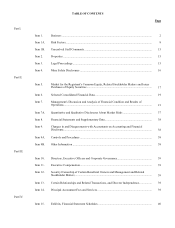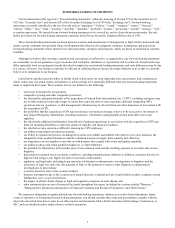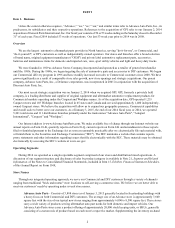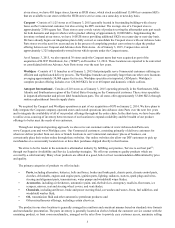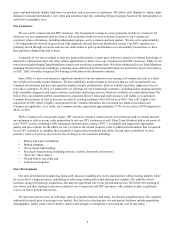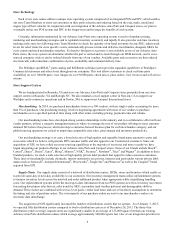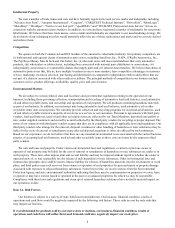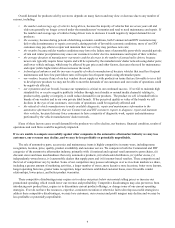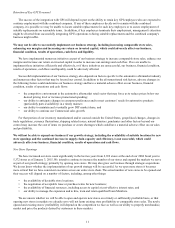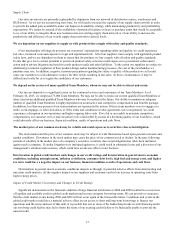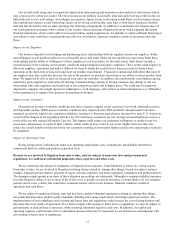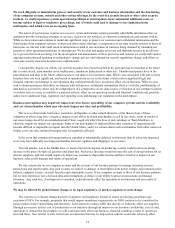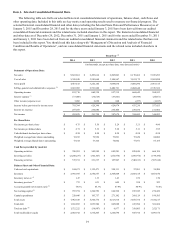Advance Auto Parts 2014 Annual Report Download - page 17
Download and view the complete annual report
Please find page 17 of the 2014 Advance Auto Parts annual report below. You can navigate through the pages in the report by either clicking on the pages listed below, or by using the keyword search tool below to find specific information within the annual report.10
We may not be able to successfully integrate GPI’s operations with ours; the GPI business may not achieve the expected
business results and could cause us to incur unexpected liabilities; the GPI acquisition has caused and may continue to
cause us to incur significant transaction and integration costs; our level of indebtedness could limit the cash flow
available for operations and could adversely affect our ability to service our debt or obtain additional financing; and we
may not be able to retain key GPI personnel.
Integration Issues and Business Expectations
We cannot be certain whether, and to what extent, any strategic, operational, financial or other anticipated benefits
resulting from the acquisition of GPI will be achieved. In order to obtain the anticipated benefits of the transaction, we must
integrate GPI’s operations with ours. This integration may be complex and failure to do so quickly and effectively may
negatively affect our earnings. The market price of our common stock may decline as a result of the acquisition if our
integration of GPI is unsuccessful, takes longer than expected or fails to achieve financial benefits to the extent anticipated by
financial analysts or investors, or the effect of the acquisition on our financial results is otherwise not consistent with the
expectations of financial analysts or investors.
The acquisition of GPI could cause disruptions in and create uncertainty surrounding GPI’s and our businesses, including
affecting GPI’s and our relationships with existing and future customers, wholesalers, independently-owned and jobber stores,
suppliers and employees, which could have an adverse effect on GPI’s and our businesses, financial results and operations. In
particular, GPI and Advance could lose customers or suppliers, and new customer or supplier contracts could be delayed or
decreased or otherwise adversely affected in economic value. In addition, we have diverted, and will continue to divert,
significant management resources towards the integration efforts, which could adversely affect our business and results of
operations.
In connection with our acquisition of GPI, we assumed all of the liabilities of GPI, including any actual or contingent
liabilities to which GPI is or may become subject. GPI may be or may become subject to loss contingencies, known or
unknown, which could relate to past, present, or future facts, events, circumstances or occurrences. Although the agreement
pursuant to which we acquired GPI provides us with certain indemnification provisions, potential costs relating to any such
liabilities could exceed the amount of any such indemnification or extend beyond the indemnification period.
Additional Transaction and Integration Costs
In connection with the GPI acquisition, we have incurred significant one-time transaction costs and entered into new
financing agreements and issued new debt instruments. We expect to incur additional transaction and integration costs in
connection with the acquisition. Although efficiencies related to the integration of the businesses may allow us to offset
incremental transaction and integration costs over time, this net benefit may not be achieved in the near term, or at all.
Level of Indebtedness
In connection with our acquisition of GPI our level of indebtedness increased significantly. Our indebtedness could restrict
our operations and make it more difficult for us to satisfy our debt obligations. For example, our level of indebtedness could,
among other things:
• affect our liquidity by limiting our ability to obtain additional financing for working capital, limit our ability to obtain
financing for capital expenditures and acquisitions or make any available financing more costly;
• require us to dedicate all or a substantial portion of our cash flow to service our debt, which would reduce funds
available for other business purposes, such as capital expenditures, dividends or acquisitions;
• limit our flexibility in planning for or reacting to changes in the markets in which we compete;
• place us at a competitive disadvantage relative to our competitors who may have less indebtedness;
• render us more vulnerable to general adverse economic and industry conditions; and
• make it more difficult for us to satisfy our financial obligations, including those relating to the notes associated with
the acquisition of GPI.
In addition, the indenture governing the notes related to the GPI acquisition and the credit agreement governing the new
credit facilities contain financial and other restrictive covenants that limit our ability to engage in activities that may be in our
long-term best interests. Our failure to comply with those covenants could result in an event of default which, if not cured or
waived, could result in the acceleration of all of our debt, including such notes.


